2019 Seoul International Forum on Elections
- The 2019 Seoul International Forum on Elections was held at the Hotel Shilla Seoul on October 24, 2019. The overview theme of the forum was 'The Role of Election Management Bodies in a Changing World' and it was attended by around 100 election officials, senior staff from international organizations and experts on democracy and elections.
-
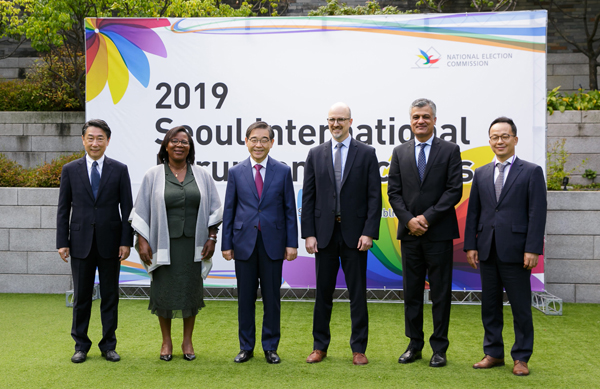
Opening Ceremony Photo. Left to Right: Joon Oh (Chair of Save the Children Korea, Former Korean Ambassador to the UN), Jane Ansah (Chairperson of the Malawi Electoral Commission), Soon-il Kwon (Chairperson of the NEC), Kyle Lemargie (IFES), Abdullah Ahmadzai (The Asia Foundation) and Seong-yi Yun (Kyung Hee University)
- There were three sessions, each of which consisted of three presentations and a Q&A session. The presentations during this year's forum were as follows:
- [Session One]
Election Campaigning: Freedoms and Responsibilities in the New Media Age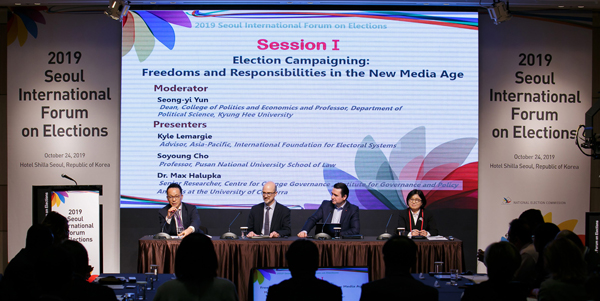
-
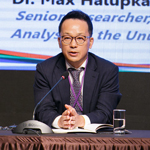
Moderator:
Seong-yi Yun (Dean, College of Politics and Economics and Professor, Department of Political Science, Kyung Hee University) -
Presenters:
- Kyle Lemargie (Advisor, Asia-Pacific, International Foundation for Electoral Systems, IFES)
Presentation Content:
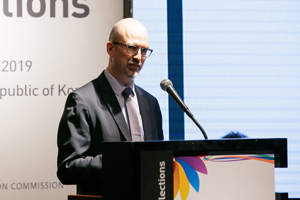
- Dealt with the problem of disinformation polluting public discourse and eroding electoral integrity.
- Noted the issue that disinformation travels faster and further than facts, and this creates a problem for preventing or correcting disinformation.
- Discussed what kind of regulation or self-regulation can be used by EMBs and regulatory bodies to deal with disinformation and used examples he found in places IFES have worked in, including Indonesia.
- Provided an overview the implications of the spread of disinformation on EMBs.
- Soyoung Cho (Professor, Pusan National University School of Law)
Presentation Content:
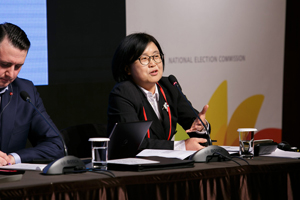
- Dealt with the Korean case of increased election campaigning through the internet, especially the pros and cons and how the rule has changed as campaign methods have evolved.
- Described current regulations of the Public Official Election Act regarding online campaigning and current debates about how to reform them to improve both freedom and privacy.
- Raised issues surrounding anonymity online in Korea, the removal of disinformation from the internet and the impact on civil servants in Korea.
- Dr. Max Halupka (Senior Researcher, Centre for Change Governance, Institute for Governance and Policy Analysis at the University of Canberra)
Presentation Content:
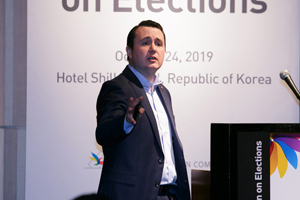
- Introduced information and data on the decline of trust and satisfaction in Australian democracy, what this means and how to improve it.
- Described research done by the University of Canberra and Democracy 2025 on views on democracy. There is hope for the future when looking at young people's engagement with and views on democracy. There is now a focus on authenticity among young voters.
- Highlighted the importance of trust to democracy and the issues of a lack of social and democratic trust. Thankfully, although trust is at an all-time low, people still believe in democracy.
- Put forward reforms that have been popular in their research that would help improve the democratic system and rebuild trust.
- [Session Two]
Measures to Improve Credibility in Election Polls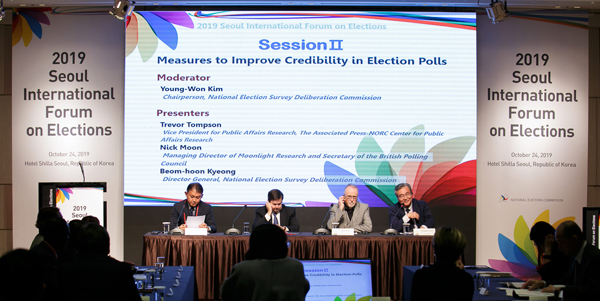
-
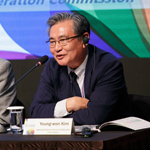
Moderator:
Young-Won Kim (Chairperson, National Election Survey Deliberation Commission) -
Presenters:
- Trevor Tompson (Vice President for Public Affairs Research, The Associated Press-NORC Center for Public Affairs Research)
Presentation Content:
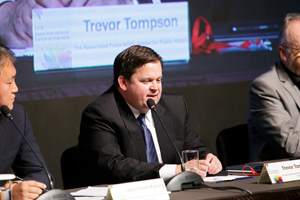
- Presented an overview of the work of AP-NORC, a combined project between the University of Chicago and AP that does not focus on the pre-election horse race polling and instead focuses on voting blocks and issues as well as public confidence in democracy and elections.
- Highlighted that national polling is mostly accurate, but state polling is underfunded and not using modern methods, reducing accuracy. However, when properly performed and using best practices polling is increasingly accurate, including many 2016 nationwide polls.
- Called for more understanding in the media of polling and made the point that some of the lack of trust in polling or inaccuracy is caused by a lack of understanding of polls in media organizations.
- Argued for as few regulations as possible in polling due to the possible slippery slope of government regulating journalism. However, highlighted the need for transparency and openness.
- Described the work of AP Votecast (exit poll) and the use of new innovations such as weighting calibration and focus on transparency. Also noted the growing issue of increased early voting and partisan nonresponse bias that hampers traditional exit polling.
- Nick Moon (Managing Director of Moonlight Research and Secretary of the British Polling Council)
Presentation Content:
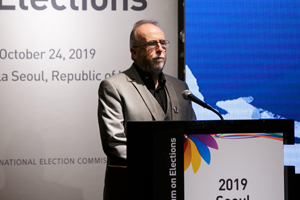
- Provided an overview of elections and polling in the UK.
- Highlighted that currently there are no regulations for election polls in the UK but the British Polling Council (BPC) was set up to encourage self-regulation and best practices among polling organizations. This organization however does not formally regulate polling.
- Described the regulations organizations adhere to in the BPC that are focused on good methodology, transparency and peer review. This helps to improve fairness.
- Argued for the importance of exit polls, especially in developing countries where they can be used to check for any fraud or poor election management. They can help to increase confidence and trust. For example, in Georgia, where power changed for the first time peacefully and polling helped to show the voting process had produced an accurate and fair result.
- Beom-hoon Kyeong (Director General, National Election Survey Deliberation Commission)
Presentation Content:
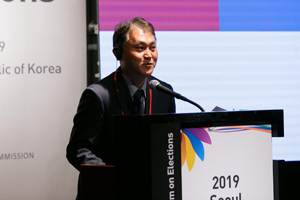
- Provided an overview of the history of election polls in Korea, how they have developed and become more widespread and how they are now regulated.
- Described the current legislation in Korea surrounding election polls and the roles of the National Election Survey Deliberation Commission (NESDC).
- Highlighted the current issues with election polls, breaking them down into external, internal and institutional factors that make polling more difficult or causing unfair or biased polls.
- Recommended measures to develop polling credibility and fairness, including increasing survey literacy among the media and voters and strengthening the expertise of the NESDC.
- [Session Three]
Case Studies on Measures to Increase Voter Participation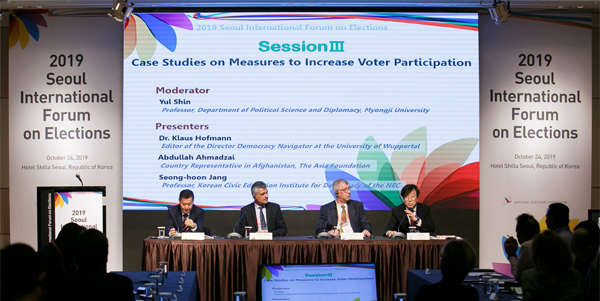
-
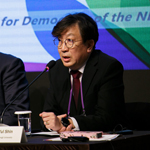
Moderator:
Yul Shin (Professor, Department of Political Science and Diplomacy, Myongji University) -
Presenters:
- Dr Klaus Hofmann (Editor of the Direct Democracy Navigator at the University of Wuppertal)
Presentation Content:
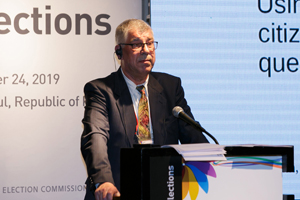
- Described how there are quite simple ways of reducing participation, including not actively encouraging participation and simply waiting for people to get involved, encouraging application but then not actually having any say in policies or not giving clear information about their participation.
- Introduced two cases of improving more direct democracy at a local level. In Falun (Sweden) they are encouraging more local referendums, opening a democracy center and showing more information online. In Wuppertal (Germany), they have introduced a citizen budget and created a city participation and advisory council. The aim of both is to keep people more involved directly.
- Introduced two larger scale cases: Ireland (State of Oregon USA) and the EU. Both included either a citizen assembly or an advisory council with the aim of getting more people involved with decision making.
- Abdullah Ahmadzai (Country Representative in Afghanistan, The Asia Foundation)
Presentation Content:
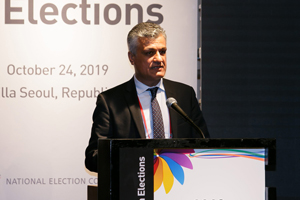
- Described the case of Afghanistan, how national and international bodies in Afghanistan have helped to develop democracy and public participation in politics.
- Highlighted the difficult situation in the country, including widespread mistrust of elections and parts of land previously held by insurgents. Also, there has been a decline in turnout in the key elections post-Taliban (since 2004). This is being caused by insecurity, trust deficit and lack of confidence.
- Despite the issues, tech and media as well as civic education is improving and increasing ways in which public participation can be carried out.
- Recommended ways to further develop public participation in Afghanistan and other countries including strong civic education, improving transparency in the election process and ensuring a strong, efficient and independent EMB.
- Seong-hoon Jang (Professor, Korean Civic Education Institute for Democracy)
Presentation Content:
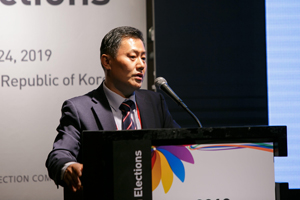
- Set out measures in the NEC and the Korean Civic Education Institute for Democracy (KOCEI) have developed to improve turnout and further develop representative democracy.
- Highlighted the factors in Korea that are holding back further increases in voter turnout including indifference to politics, a lack of preferred candidates and a lack of awareness.
- Described the technical changes to election management developed by the NEC to increase turnout and the education programs offered by KOCEI to increase voter awareness.